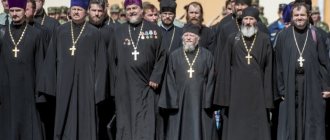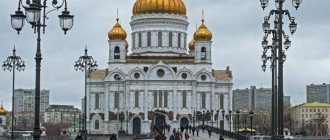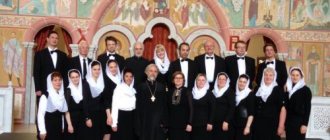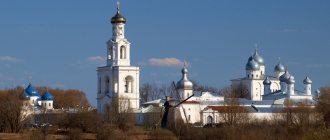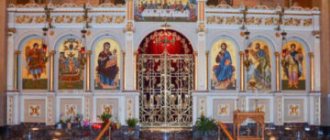Against the background of information that sometimes appears in news feeds about the incredibly large incomes of the Orthodox clergy, the question involuntarily arises about the law that concerns the integrity of the church and its taxes. Does the Russian church really pay no taxes and is its wealth as great as they say?
Today we will try to answer the question about the taxation of religious organizations, the right to own property, real estate and land plots.
What is a church
To figure out whether the church pays taxes in Russia, let’s define what the Russian Orthodox Church essentially is from a “business” point of view. Religious organizations in our country are considered full participants in economic relations - they conduct certain activities, own any property - movable, real estate, land. It is logical that with all this they have the right to be called legal entities.
In addition to all of the above, religious organizations engage in specific religious activities - they conduct certain rituals and ceremonies, meetings and events. Art. 8 Federal Law No. 125 “On freedom of conscience and non-religious associations” defines the concept of “church” as follows: a voluntary association of groups of citizens, which was formed to spread the faith and jointly practice it, among other things, registered as a legal entity.
Legal framework and church
Let's consider legal acts that in one way or another relate to church taxes to the state in Russia:
- Federal Law No. 7 “On Non-Profit Organizations”: the church has the right to engage in business, as well as create a number of its own enterprises and organizations.
- Federal Law No. 129 “On state registration of individual entrepreneurs and legal entities”: the church and its branches are subject to mandatory state registration.
- The previously mentioned Federal Law No. 125, Article 11: for religious organizations a special procedure for state registration is implied.
- Tax Code of the Russian Federation, Article 3, paragraph 1: products of religious significance are exempt from VAT.
- Decree of the Government of the Russian Federation No. 251 (03/31/2001): the document contains a complete list of items and services sold by the church and exempt from VAT.
- Agreement “On the Import of Educational, Scientific and Cultural Materials”: imported religious imported products are subject to taxes no higher than those applied to similar goods in the territory of the host state.
Salaries of priests in Russia
Since 2009, control and accounting of the economic activities of the church in Russia has been carried out by the Financial and Economic Administration. All clergy of the Russian Orthodox Church must have appropriate documents that confirm and register their work activities. Among them:
- Employment history.
- Medical insurance.
- Number in the Pension Fund.
Priests of the Russian Orthodox Church receive financial support equal to the regional average salary
Based on these documents, clergy receive a fixed monthly salary with contributions to the Pension Fund.
Monthly payments to priests in the form of wages are equal to the regional average salary of a public sector employee (teacher, doctor, civil servant) - this is about 16-20 thousand rubles in the central zone of the Russian Federation and slightly higher in the central region and the Far East (up to 50-80 thousand).
Since 2013, according to the law, clergy have the right to financial support from the Russian Orthodox Church. To receive it, clergy must submit a corresponding request to their local diocese. Today there is a special commission whose work is to care for ministers and provide assistance to them, especially large families in need of social protection.
Church income
Does the church pay taxes in Russia and on what income? This is a very interesting question for Russian citizens. Let us list the main points that make up the profit of a religious organization:
- donations from believers for services and commemorations;
- donations from patrons and sponsors;
- sale of candles;
- sale of books and religious paraphernalia;
- “circle” gathering after the service;
- income from the activities of commercial church organizations;
- transfer of a number of church facilities for free use;
- receipts from the state budget of the Russian Federation.
Church income
The Orthodox Church has its own income, which represents the profit of the religious community. It is considered a non-profit enterprise that exists independently on its own funds. In fact, the Russian Orthodox Church does not have the right to commercial activities aimed at making a profit. However, the church has income, which is unofficial and not reflected in any documentation. What does the income of the Russian Orthodox Church consist of?
- donations brought by parishioners to the service;
- payment to clergy for conducting religious sacraments such as baptism, wedding, funeral service, etc.;
- sponsorship donations;
- sales of Orthodox books, icons, various paraphernalia;
- profit from organizations subordinate to the Russian Orthodox Church;
- benefits for utility costs and electricity;
- income from a farm transferred to free church use.
On average, the Russian Orthodox Church owns more than 30 thousand churches and about 300 dioceses, bringing in about 3 million rubles monthly. Church activities are structured in such a way that they exist autonomously, without asking the state for funds from the budget. The monasteries have their own territories for economic needs, on which there are fruit orchards, vegetable gardens or livestock farms, etc.
VAT for the church
Speaking about what taxes the church pays in Russia, it is necessary to touch upon those payments from which a religious organization is exempt or which it transfers to the treasury on a preferential basis. First of all, let's pay attention to VAT - here is a list of the fact that sales directly by the church give it the right not to pay this 18% tax to the state treasury:
- Objects of religious worship: icons, statues, altars, calvary, etc., as well as elements that form an indivisible whole with them: covers, icon frames, vestments, etc.
- Interior decoration items, architectural elements: iconostases, tombs, shrines, censers, candlesticks, gates, window grilles, thrones, altar cabinets, etc.
- Items of paraphernalia of the Orthodox religion: crosses, belts with prayers, staves, medallions, standards, banners, wands, amulet, artistic forms of Easter eggs, etc.
- Necessary elements and substances without which it is impossible to conduct a divine service: incense, oil, censer, candles, myrrh, instruments for unction, cherubs, seals for prosphora and artos, etc.
- Clothes of clergy: robes, belts, armbands, clubs, legguards, felonies, scarves, aprons, etc., as well as holders, hangers, cases, chains, shafts, etc. for them.
- Paper products: liturgical books (Holy Scripture, prayer books, calendars, sheet music, religious performances, religious calendars, etc.), religious, educational, educational books, official forms and printed goods of religious organizations (letters, diplomas, postcards, messages, prayers, canonical images, photos, etc.)
- Video and audio products of the church: materials that visually teach, enlighten, illustrate elements of teaching, religious practice, worship, etc.
- Repair and restoration work necessary for the temple - if it is carried out by an organization that has a license for such activities.
It is important to note that VAT exemption on the listed items is available not only directly to the church, but also to a commercial company whose authorized capital is entirely the contribution of a religious association.
Church and legal nuances
To understand what taxes the Russian Orthodox Church pays to the state, you need to understand what the church is from the point of view of legislation. Religious communities and organizations are full participants in economic relations. They are engaged in certain activities, have their own property, which consists of land holdings, real estate, etc. Therefore, church communities must act as legal entities.
In addition, church activities are associated with religious ceremonies, rituals, various events and meetings. According to Federal Law-125, the church is a legal entity representing a voluntary association of people for the spread of the Orthodox faith.
But since it is a non-profit community, by law the Russian Orthodox Church must submit an annual financial report to the Federal Registration Service. After much debate, the patriarchs literally knocked out the possibility for the Russian Orthodox Church to draw up a simplified version of reporting, which is now carried out in the following areas:
- Accounting for all receipts from legal entities, regardless of their citizenship (Russians or foreign citizens).
- Reporting on all main types of church activities.
- Mandatory indication of the item of income for funds received as a result of the use of other property.
- Report on financial expenditures of funds received from parishioners (or organizations).
In addition, the state, through a series of decrees and agreements, regulates the list of services and items exempt from taxation, as well as imported Orthodox paraphernalia, taxes on it, etc.
Property Tax for Church Organizations
Art. 381 of the Tax Code of the Russian Federation exempts the church from paying property tax, but only in relation to that movable and immovable property that is directly used for carrying out religious activities. A church dormitory, a building for the brethren, etc. will already be subject to this tax in the same amounts as for other Russian taxpayers. But there is one thing: property tax is regional, which means, in accordance with the Tax Code of the Russian Federation, Art. 12, paragraph 3, entities can independently set its size for non-profit payers. For religious organizations it is set equal to zero.
Land tax for the church
When asking whether the church is exempt from taxes in Russia, we will also touch upon such an important budget revenue as land tax. Plots owned by a church are exempt from it in two cases - if it has:
- Lands owned by the right of perpetual use.
- Territories where temples, churches, chapels, as well as buildings for both religious and charitable purposes are built. The latter include: buildings for certain religious services, prayer, religious buildings, premises for meetings, rituals, ceremonies;
- pilgrimage centers and hotels for pilgrims owned directly by the church;
- religious church organizations - seminaries, theological schools, religious schools and dormitories for students;
- charity canteens, hostels and hospitals, Orthodox orphanages, educational institutions with charitable status, etc.
According to the letter of the Ministry of Finance No. 03-06-02-02/41. The entire plot owned by the church is exempt from land taxation, even if there are buildings on its territory that are not related to those listed above. And the Tax Code of the Russian Federation (p. 395, clause 4) states that preferential treatment will be given to land that is the property of the Orthodox Church, but on which buildings and structures of other religious denominations are located.
Continuing the topic “Does the church pay taxes in Russia?” letter of the Ministry of Finance No. 03-05-04-02/31 dated May 7, 2008 warns that a site owned by a religious organization, but having on its territory only buildings and structures for the sale of paraphernalia, literature, etc., without the presence of religious buildings and charitable purposes, is fully subject to land tax.
What taxes does the church pay in Russia?
Since the times of the USSR, the church has lived its own life, separately from the state.
What taxes does the church pay in Russia, if it is on its own, and does it make any contributions to the state budget at all? The issue of taxation of income of religious organizations has been resolved for about ten years. Most people believe that the church should pay taxes like all citizens, since it collects very large amounts of donations from people and spends this money on its needs. To answer this question, you need to familiarize yourself with information about the profit of this organization.
Profits of religious organizations
Since the church is a non-profit organization, then, by law, it must support itself. The purpose of a non-profit organization is not to make a profit. Main income of the church:
— sale of church supplies;
— donations from parishioners;
- payment for memorials and weddings,
- baptism and other rituals;
- club fees.
In addition, the Orthodox Church in Russia owns several commercial enterprises, the income of which fully supports about 19 thousand parishes. According to the laws of the Russian Federation, this type of activity is not prohibited for religious organizations. The Russian Orthodox Church owns 10 workshops for the production of candles. The cost of candles and the price of products in the church vary significantly. The retail cost is many times higher than the manufacturing costs.
Patriarch Kirill at the last meeting reported that the Russian Orthodox Church contains 34.5 thousand churches and 293 dioceses. Every month, donations from the church are transferred to the diocese. Only objects that are in the process of restoration or construction are exempt from such contributions (for a while). Collections of donations are carried out by the head bishop of each church. In turn, he personally keeps a report for the patriarchate. About three million rubles is the monthly income of churches in Russia.
The accounting of the Russian Orthodox Church is carried out according to the following principle: after the service, a box with donations from parishioners is opened, which are transferred to the church treasury. Every month, accounting reports are submitted to the diocese, which clearly outlines the number of services, baptisms, weddings, etc. and indicates what percentage was transferred to the diocese. This percentage can range from 10 to 50%.
Salaries of priests in Russia for 2016-2017
In the Russian Federation, everything happens not quite the same as in other countries. To conduct the economic management of church organizations, the Financial and Economic Department was created in 2009. Today priests in Russia have the following documents:
— work book where the position is indicated;
- medical insurance;
- number in the Pension Fund.
The salaries of church ministers are set by the rector as a fixed amount. It is equal to the average salary of a public sector employee (teachers, doctors, psychologists, etc.). In 2013, a law was passed according to which priests in need of financial assistance can turn to the diocese for help. This law also states that clergy have the right to social protection, which is why a commission was created to care for those who need it.
Russian legislation in relation to the Russian Orthodox Church
Does the church pay taxes in Russia? Since the church is a non-profit organization, in accordance with the law adopted in April 2006, it must submit monthly financial statements to the Federal Registration Service (FRS). During the year, the patriarchs sought to simplify the reporting conditions, and in April 2007, amendments were made to the law. The purpose of this action was to facilitate church financial reporting.
In accordance with the amendments, reporting should be carried out under four articles:
1. According to the charter, there must be reports on the main activities.
2. Servants should note receipts of financial resources from both Russian and foreign legal entities.
3. It is also necessary to indicate funds from the use of other property.
4. It is necessary to keep reports on the expenses of funds received from citizens of the Russian Federation (organizations registered on the territory of the Russian Federation), from stateless persons and from foreign organizations.
What taxes does the church pay in Russia?
For religious organizations, the legislation of the Russian Federation provides benefits for paying taxes. Churches were exempt from the following payments (tax benefits Article 381 of the Tax Code of the Russian Federation):
— land tax;
— tax on property used for religious purposes (according to Article 381 of the Tax Code of the Russian Federation); tax on church ceremonies and sales of church items (the law states that the church does not pay
- value added taxes on the sale of religious items).
Tax benefits on the sale of church items
In 2001, the Government of the Russian Federation established a complete list of religious items that are not subject to taxation.
The list contains five exceptions:
1. Objects of religious worship, including icons, icon frames, thrones, altars, conical images, vestments and so on.
2. Decoration of temples and architectural elements.
3. Church paraphernalia, including crosses, amulet, medallions, orders, memorial signs and more.
4. Items for worship and rituals.
5. Clothes for religious purposes: robes, felonies, surplices, armbands, belts, and so on.
Property tax benefits
In the Tax Code of the Russian Federation, the Russian Orthodox Church is exempt from paying taxes on property used for religious purposes. Property tax benefits are not taken into account unless properties qualify for religious use (such as dormitories or fraternity houses). In accordance with the law Art. 372 of the Tax Code, property tax is a regional tax, therefore the authorities of individual constituent entities of the Russian Federation have the right to establish their own benefits for some non-profit organizations in the territory. As a result, religious organizations pay zero percent of taxation.
Land taxes
What taxes does the church in Russia pay for land holdings? According to the law of the Russian Federation, churches are exempt from taxes on land plots if religious buildings are located on these plots. These include:
— objects for worship (chapels, temples and other religious buildings);
- objects of religious veneration (pilgrimage centers that belong to the Orthodox Church);
— spiritual educational facilities (seminaries, clergy schools, colleges and dormitories);
- buildings that serve other church activities (buildings for charitable purposes).
Does the church pay taxes in Russia for buildings on its territory that are not classified as religious sites? The Russian Orthodox Church uses such benefits for land and builds buildings on its territories that are not intended for religious purposes. For such buildings, tax is also not paid to the state treasury.
Income taxes
What other taxes does the church pay in Russia? The Russian Orthodox Church is a profit taxpayer. But this does not apply to the following types of income:
— income from property;
— targeted income, which includes money for the maintenance of non-profit organizations (contributions, charitable income, funds received from individuals, funding from the budget of the Russian Federation, property passed on by inheritance)
These cash receipts should be used to carry out the main activities of the temples. In order to legally use such funds, they must meet the following requirements:
— funds are intended only for the maintenance of churches, temples and religious sites;
— complete financial records of income and expenses must be maintained;
— at the end of the tax period, the church must submit its financial report to the tax service, which will describe the intended use of the funds received.
If the above requirements are not met, the cash receipts will be treated as unrealized income.
Transport taxes
The question of great interest among citizens is: “What taxes does a religious organization pay for the use of cars?” In accordance with Law 357 of the Tax Code, vehicle tax is paid by the person to whom the car is registered. The Russian authorities do not provide benefits in this case. Therefore, taxes must be paid in full on vehicles that belong to spiritual organizations. But in fact, car benefits are introduced by the laws of the constituent entities of the Russian Federation.
Citizens' opinions on paying taxes to the Russian Orthodox Church
Many believe that payments to the state budget are not made by the Orthodox Church. The accounts of such organizations contain billions of dollars of wealth that are not controlled by anyone. Citizens are outraged not only by tax benefits, but also by state bonuses from the Russian government:
— getting rid of paying all utilities;
- free use of electricity.
Not only the economic issue, but also the politics of the Orthodox Church worries the residents of the country. For example, parishioners complain about such announcements in the church: “You can only light candles in the church that you made yourself; it is prohibited to light other people’s candles.” Activists believe that the Russian Orthodox Church should conduct its activities on the basis of the laws of the country.
Read more ➤
PS I ask the Orthodox not to be angry...
Religious organization and income tax
The church tax in Russia is also a profit tax. According to the Tax Code of the Russian Federation, Art. 246, paragraph 1, the religious organization is its payer. However, a number of benefits are provided for it here too - when compiling the tax base, the following is not taken into account:
- Property (including money) and property rights that came to the church budget in connection with the performance of religious rites and ceremonies, as well as as a result of the sale of its specialized paraphernalia and literature.
- Targeted revenues (except for those related to excise taxes). This includes:
- donations and contributions;
- property passed by will or inheritance;
- property received for the implementation of statutory activities;
- grants from individuals and organizations included in the List of Government Decree No. 485 (06/28/2008).
Targeted revenues are not taxed only if they were spent strictly for their intended purpose - the church must provide a detailed report to the tax authority.
Preferential conditions for the church
The Russian Orthodox Church may not pay the state an 18% tax on income in several cases:
- If the income comes from the sale of religious items and items for worship. This applies to icons, statues, altars, vestments, frames and other occult objects.
- This also includes parts of the interior and architectural elements such as iconostases, tombs, candlesticks, forged grilles, and altar items.
- The list also includes paraphernalia necessary for performing various rituals: crosses, banners, amulet. This also includes the vestments of church ministers, printed materials, audio and video materials to illustrate the services.
- Repairs and restoration are carried out by organizations that have a special license for such work.
Preferential conditions regarding the payment of taxes to the state also apply to all commercial companies whose authorized capital is a contribution of the Russian Orthodox Church.
Taxes paid by the church
Does the church pay taxes to the state in Russia? 91% of those interested in this issue cannot find what is subject to taxes from the activities and property of the church. The religious organization pays the following:
- Transport tax: tax is paid on all transport operated by the church in the same amounts as for other taxpayers.
- Excise duties (Tax Code of the Russian Federation, Article 181): cosmetics and perfumes, alcohol-containing substances, medicines, prophylactic products, etc. Note that jewelry products, including those sold by the church, are not an excise item.
So, does the church pay taxes in Russia? The answer will be positive, but with a number of buts - after all, in the Russian Federation, religious organizations are provided with a large number of tax benefits.


